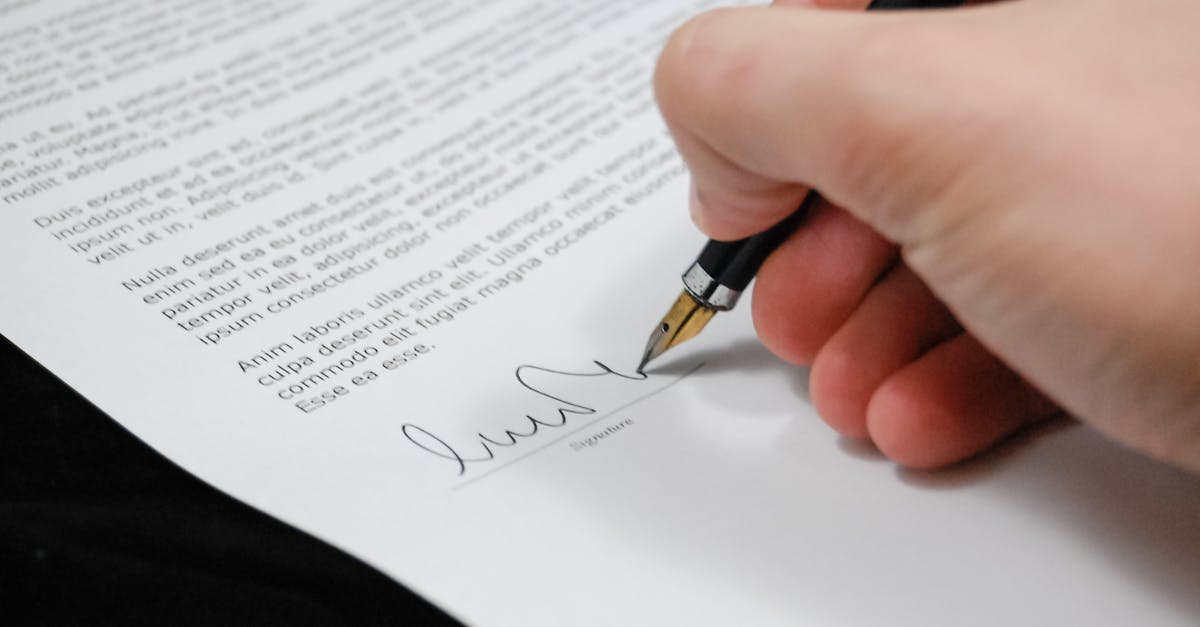
Filing legal documents
Table Of Contents
At San Diego Lawyers, we understand the importance of properly filing legal documents. Our team of experienced attorneys are well-versed in the intricacies of the legal system and can efficiently handle the filing of all necessary paperwork on behalf of our clients. Whether it be submitting court filings, drafting contracts, or processing other important legal documents, we ensure that all paperwork is accurately completed and submitted in a timely manner. Trust San Diego Lawyers to take care of the details so you can focus on what really matters.
Maintaining Organized Records of Legal Documents
Maintaining organized records of legal documents is crucial for lawyers and law firms to ensure smooth operations and effective representation of clients. By categorizing documents according to case, client, or type, legal professionals can easily access required information without delay. Implementing a consistent naming convention and file structure helps in quickly locating essential documents, which is beneficial during time-sensitive situations such as court appearances or client meetings.
Utilizing electronic document management systems can further enhance the organization of legal files by enabling keyword searches, version control, and secure backup options. Regularly purging outdated or irrelevant documents from the system minimizes clutter and streamlines the retrieval process. Moreover, training staff on proper document handling procedures and data security measures is vital to maintaining the integrity and confidentiality of legal records.
Best Practices for Storing and Accessing Legal Files
When it comes to storing and accessing legal files, organization is key. Utilizing a systematic filing system can help ensure that important documents are kept safe and easily retrievable when needed. One effective strategy is to categorize files based on different criteria such as client name, case type, or date, and then label each file accordingly for quick identification.
In addition to maintaining a well-organized filing system, it is essential to establish clear protocols for accessing legal files. Designating specific individuals within the law firm who are responsible for managing and granting access to these files can help streamline the process and reduce the risk of unauthorized viewing or tampering. Implementing secure digital storage solutions and regularly backing up files can also enhance accessibility while maintaining the confidentiality and integrity of sensitive legal documents.
Reviewing and Updating Legal Documents Regularly
Reviewing and updating legal documents regularly is a critical aspect of maintaining accurate and effective records. It is essential for legal professionals to routinely revisit existing legal documents to ensure that they reflect the most up-to-date information and adhere to current laws and regulations. By conducting regular reviews, lawyers can identify any outdated or incorrect information that may impact their clients' cases or overall legal strategies.
Moreover, updating legal documents on a consistent basis demonstrates a commitment to excellence and professionalism within the legal field. Clients rely on lawyers to provide them with accurate and thorough legal representation, and part of this responsibility involves ensuring that all documentation is current and compliant. By actively reviewing and updating legal documents, lawyers can strengthen their clients' positions and enhance the overall quality of their legal services.
Importance of Keeping Legal Documents Current
Maintaining current legal documents is essential in the legal profession. A timely update of these documents ensures that the information contained within them accurately reflects the current state of affairs. By keeping legal documents current, lawyers and their clients can avoid potential misunderstandings or conflicts that may arise from outdated information. This proactive approach facilitates smooth legal proceedings and helps prevent delays or complications that could occur if information in legal documents is not up to date.
Furthermore, keeping legal documents current allows legal professionals to provide the best possible representation and advice to their clients. By having accurate and current information at their fingertips, lawyers can make well-informed decisions and strategies. This not only enhances the efficiency of legal processes but also helps in delivering outcomes that best serve the interests of their clients. In a field where details matter significantly, the importance of maintaining up-to-date legal documents cannot be overstated.
Handling Disputes Related to Filed Legal Documents
Handling disputes related to filed legal documents requires meticulous attention to detail and a proactive approach. When disagreements arise over the accuracy or validity of a document, it is crucial to address them promptly and professionally. Firstly, it is essential to review the original document and any supporting evidence to identify the source of the discrepancy. Open communication with all parties involved is key to understanding each side's perspective and working towards a resolution that aligns with legal requirements. By maintaining transparency and cooperation throughout the dispute resolution process, you can increase the chances of reaching a satisfactory outcome for all parties.
In cases where discrepancies cannot be resolved amicably, seeking mediation or legal assistance may be necessary. An unbiased third party can provide an objective perspective and offer guidance on the best course of action to resolve the dispute effectively. It is vital to document all steps taken during the dispute resolution process to have a clear record of the events and decisions made. By following established protocols and seeking professional advice when needed, you can navigate disputes related to filed legal documents with clarity and confidence.
Resolving Legal Document Discrepancies Effectively
To ensure that legal document discrepancies are handled effectively, it is imperative for law firms to establish clear protocols and procedures for addressing such issues. When discrepancies arise, it is essential for legal professionals to promptly identify the discrepancies and conduct a thorough investigation to determine the root cause. This may involve reviewing the original source documents, communicating with all relevant parties, and consulting with experts if necessary to gather all pertinent information.
Once the cause of the legal document discrepancies has been identified, it is crucial for law firms to take swift and decisive action to rectify the situation. This may involve amending the documents, updating records, or even engaging in negotiations with the parties involved to reach a resolution. It is important for legal professionals to document all steps taken to address the discrepancies and to ensure that all changes are accurately reflected in the legal files. By handling legal document discrepancies effectively and transparently, law firms can uphold their credibility and maintain the integrity of their legal records.
FAQS
What is the importance of maintaining organized records of legal documents?
Maintaining organized records of legal documents is crucial for easy retrieval, ensuring compliance, and preventing errors or misplacement.
What are some best practices for storing and accessing legal files?
Best practices for storing and accessing legal files include using a secure filing system, labeling documents clearly, restricting access to authorized personnel, and regularly backing up data.
Why is it essential to review and update legal documents regularly?
It is essential to review and update legal documents regularly to ensure they reflect current laws and regulations, avoid potential legal issues, and maintain accuracy.
What is the importance of keeping legal documents current?
Keeping legal documents current is important to ensure that they accurately represent the current status of a legal matter and can be relied upon in case of disputes or legal proceedings.
How can disputes related to filed legal documents be handled effectively?
Disputes related to filed legal documents can be handled effectively by carefully reviewing the documents, seeking legal advice if necessary, and working towards an amicable resolution with all involved parties.




